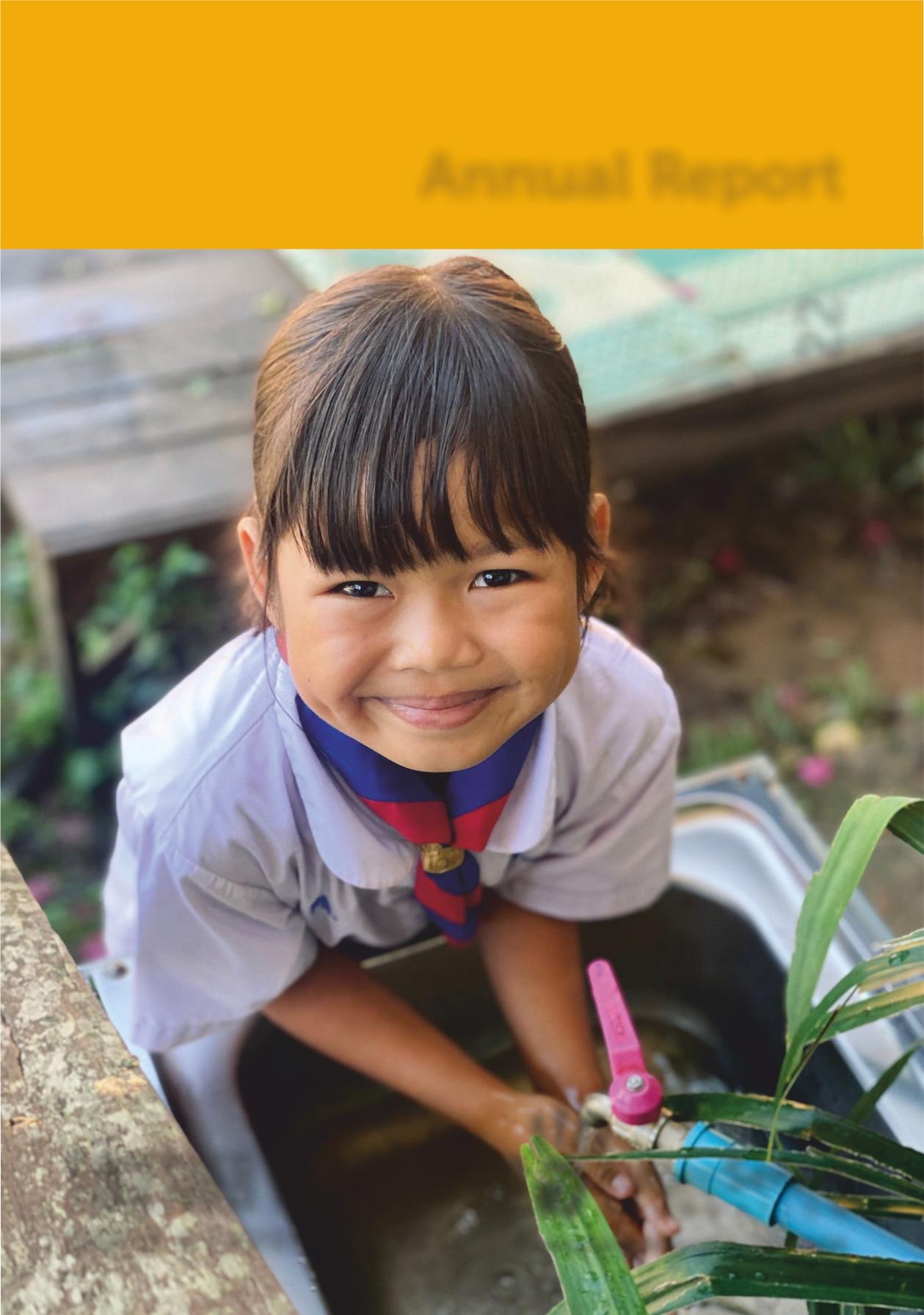
a fairer world
your handprint on the world
Annual Report 2020-2022 build
leave

ANNUAL REPORT 2020-22 3 leave your handprint on the world Contents Our Vision, Mission and Values Message from the Founder Our Approach 2020-2022 Global Footprint Quality Education Health and Well-being Livelihoods for the Future Cross-cutting Theme: Gender Equality Cross-cutting Theme: Climate Action Supplementary Education Class Programme Financial Statement Governance and Foundation Development Looking Ahead: Strategic Plan 2023-26 Thank you to All Our Supporters! Contact us ................................... 4 ........................................... 5 ................................................................. 6 ........................................ 8 ........................................................ 10 ................................................ 16 .......................................... 22 ................... 28 ..................... 32 ......... 36 ..................................................... 39 ........... 41 .................. 42 ............................. 43 ..................................................................... 44
Our Mission
To deliver long term programmes that ensure quality education, and improve health and livelihoods for disadvantaged communities, contributing towards the UN Goals for sustainable development.
Our Vision
Our Values
We are passionate about making a difference to individuals and communities we serve, always acting with integrity, empathy and energy to develop innovative solutions to meet their aspirations.
A world where even the most disadvantaged communities around the world can achieve their aspirations for a better future.

4 ANNUAL REPORT 2020-22
Message From The Founder
Dear Supporter,
It is once again my pleasure to present the FutureSense Foundation Annual Report for 2020-2022. For our Foundation, the end of another financial year provides an opportunity to reflect on our achievements and to start thinking about what we want the charity to deliver in the next 12 months. 2022 has certainly been a milestone year for us: having been able to recover from the 2 years of COVIDrelated restrictions and bounce back to full strength is nothing short of an amazing result that everyone across the organisation has contributed to and made possible.
What the past year has however, once again, shown us is just how interconnected the world is as a global economy and the impact of factors outside our control on our lives and our businesses. While the year started with the global COVID pandemic still dominating our lives, it was soon followed by the war in Ukraine, the energy crisis resulting in high inflation, with rising interest rates posing a challenge for economic growth, jobs, and cost of living in many parts of the world.
At the same time, we have been seeing the impact of global warming and climate change, with extreme temperatures, heavy rains and flooding causing devastation to communities around the world. 2022 has for many been a year that they would like to put behind them, hoping for a fresh start in 2023.
As a globally connected organisation, we have a responsibility to be aware of what is going on around us and to play our part to make a difference to lives and communities around the world. While we may not directly be able to affect the lives of those in war-torn areas or help those struggling with the cost-ofliving crisis, we can enable our community of young leaders to be more aware and think about how each one of them can join us in making a difference to the world around us.
Over 80% of the young students who participated in our overseas programmes this year have stated in their final survey that, after their programme, they considered themselves to be Global Citizens and were committed to creating a better world. The two or four weeks that these young people spend on our programmes is not only an opportunity for them to contribute to local communities but for us to help them make sense of the wider world and global issues to help ignite their compassion to contribute to a better world.
I am excited about the opportunity that 2023 could provide for the Foundation to play an even bigger part in shaping the future world around us. We are set to see our programme participants more than double, providing us with the opportunity to plan not only how we can channel the energy these young leaders bring into our projects and communities but also how, through our work and in-country discussions, we can inspire them to become active global citizens.
Finally, the Foundation would not exist without the tremendous efforts of our volunteers, donors and supporters and I thank each and every one!
With best wishes
Arvind Malhotra Founder and Chief Executive
ANNUAL REPORT 2020-22 5
leave your handprint on the world
Our Approach
FutureSense Foundation is a collaborative team of people who care about empowering local communities across the world.
We are dedicated to achieving the UN Goals for sustainable development in our six international hubs through long-term community development programmes based on the needs of rural communities.
Through in-person workshops, we support the access and advancement of education, financial awareness, and prevention and protection of good health. We achieve this through dedicated projects delivered by the foundation and targeted financial assistance.
Our programmes draw heavily on community interaction and participation. We provide individually-tailored assistance to the needs of the communities we assist, enabling us to become valued and trusted contributors.
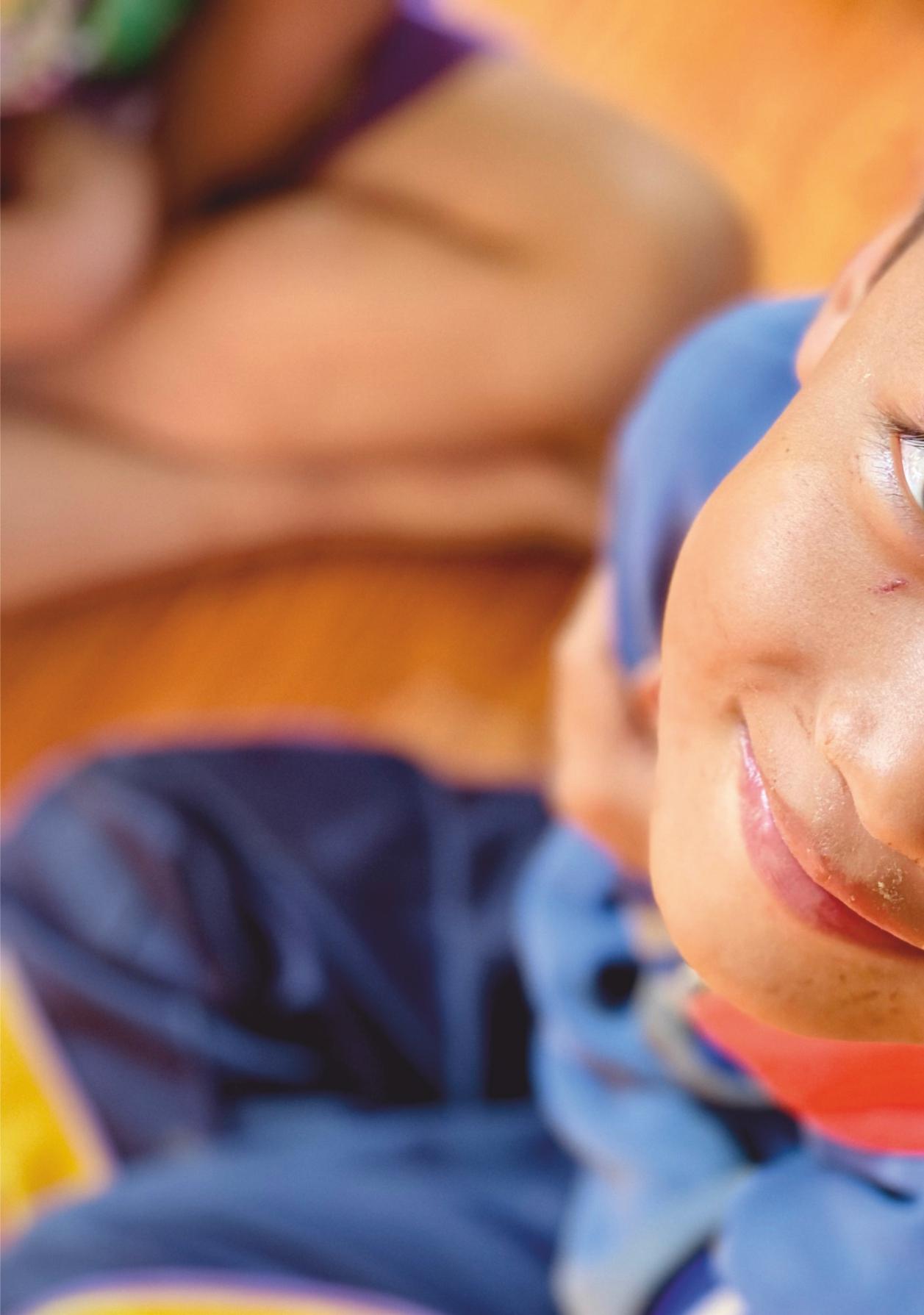
6 ANNUAL REPORT 2020-22
As we continue to extend our outreach to additional jurisdictions and challenges, our low operating cost model ensures that our programmes continue to deliver maximised commitment and impact.
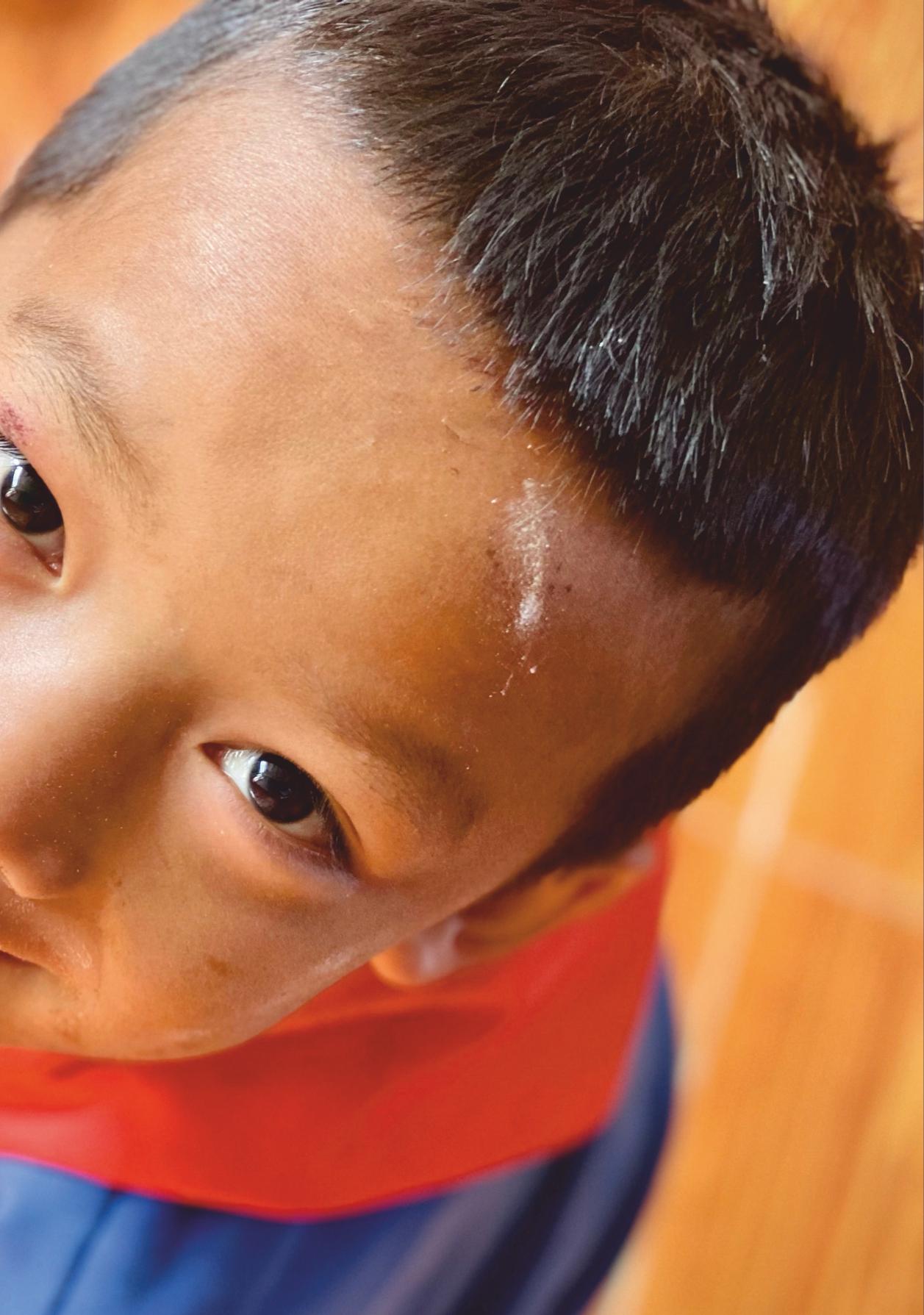
ANNUAL REPORT 2020-22 7
Global Footprint 2020-2022
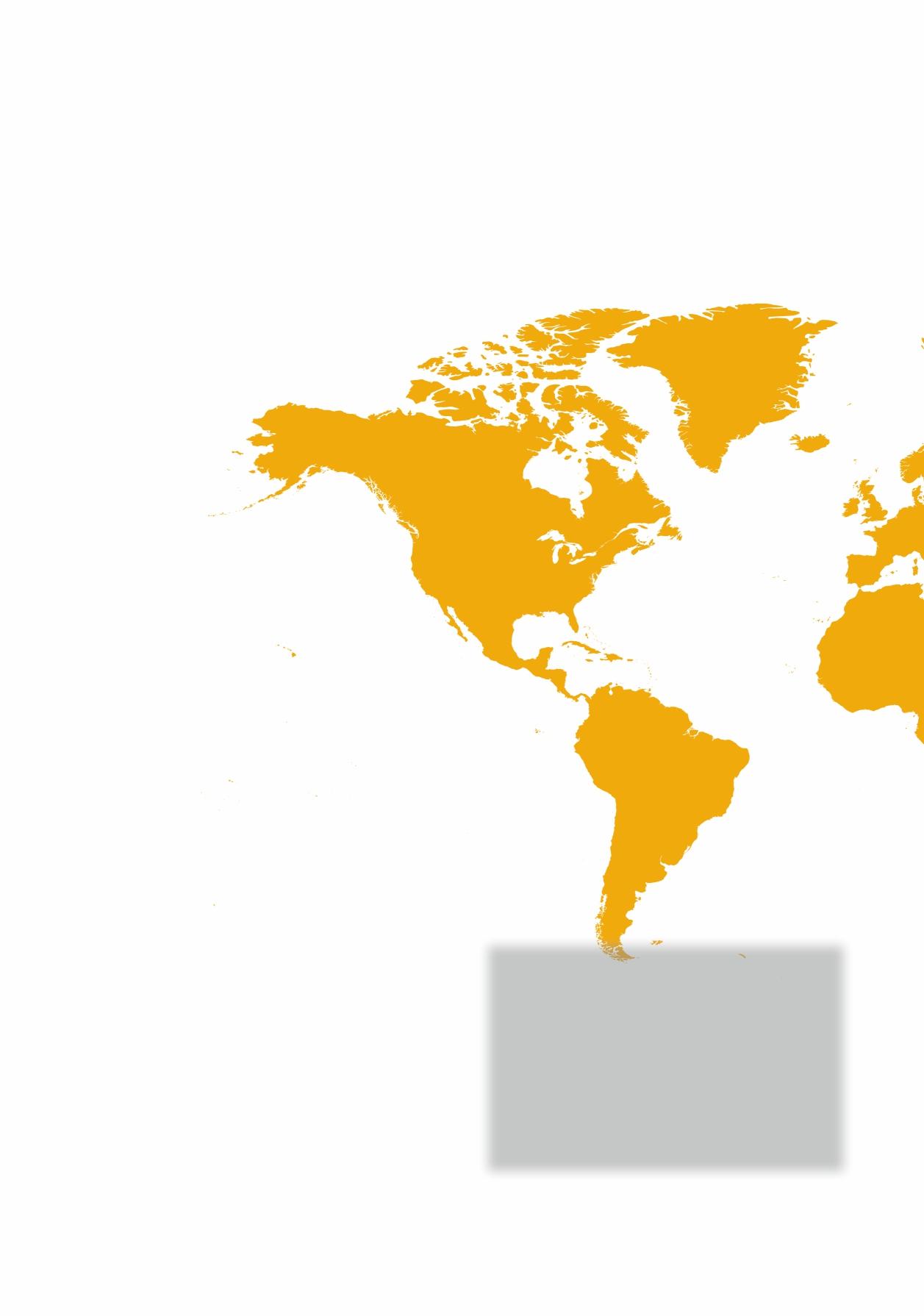
OUR IMPACT 2020-22
3829 BENEFICIARIES REACHED
2020-21
614,775 HOURS 526,426 2021-22
HOURS
Thank you to all our participants who have made these impact hours possible
Grace Hub Manager
“We want to thank those who chose Peru to support our local partners. After your visit, we had calls asking for more workshops, and our schools are interested in doing these workshops all year long. The dedication, energy, and creativity that you brought to Peru in 2022 is what we needed to take off after the pandemic.”

PERU PERU
8 ANNUAL REPORT 2020-22
INDIA
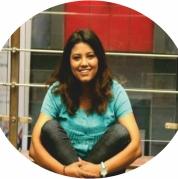

“Our international programme participants engage and get involved in creating a lasting impact on the young minds of children by giving them alternative information and knowledge through programme deliveries, and one can see the increase in the students’ level of confidence in conversational English due to this.”

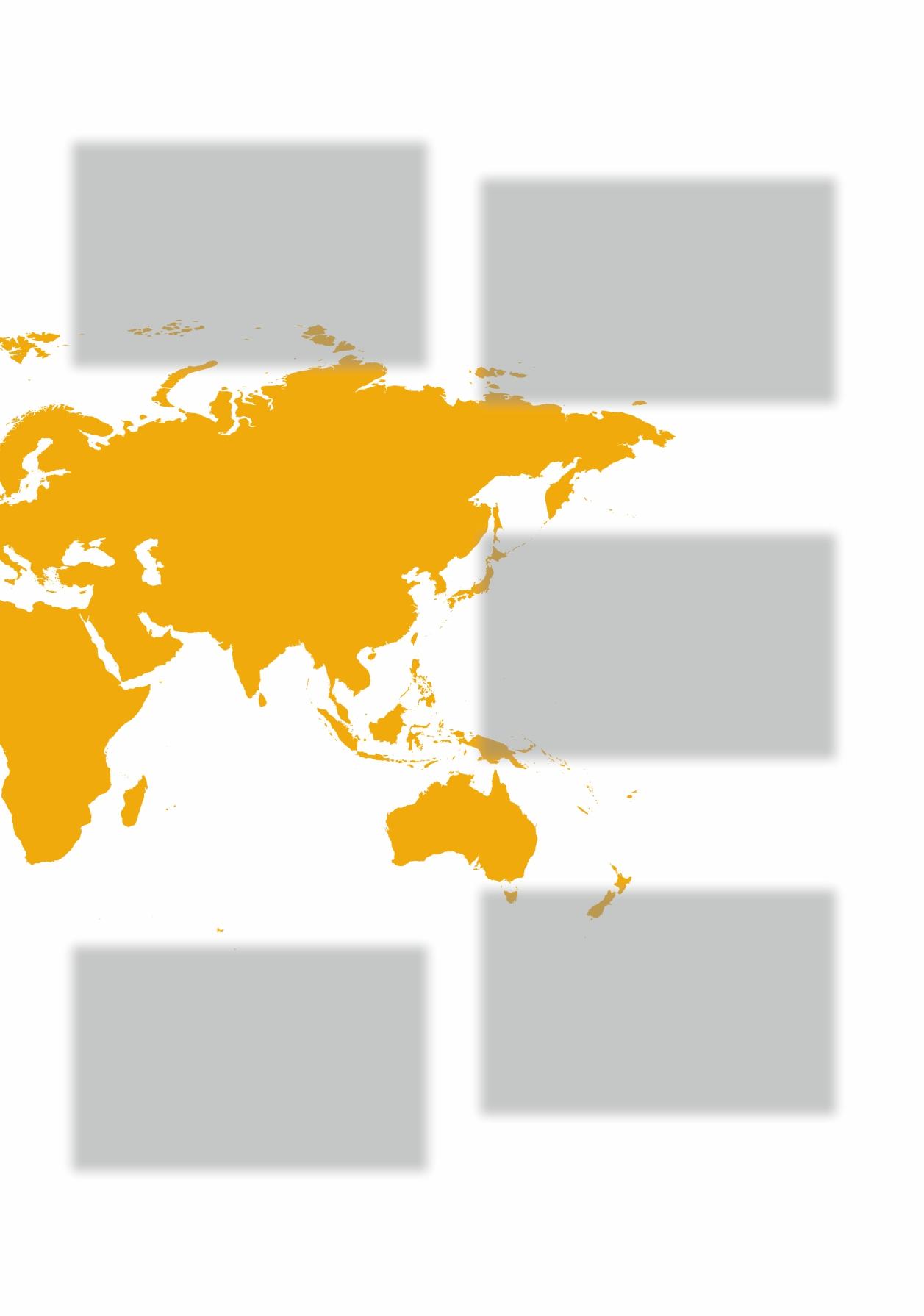
“The Tanzania hub’s goal is to ensure all children within the community we operate in are given the tools they require to succeed in life. We believe that by building brains, we build change. Our programmes significantly improve life skills and learning outcomes for the children we work with, and also promote social and behavioural change for the children, caregivers, and educators.”
We really appreciate all the hard work our participants have done for our local communities in Nepal. Workshop delivery on STEM, Creative Arts, and Personal Health and Hygiene through the FSF Model based on inquiry and experience-based learning have helped our learners to be more active, creative, and positive toward learning.”
We always love our participants’ curiosity and courage in tackling their challenges. They set a great example for the students, and we are proud of all their work in inspiring a love of learning in the children.”
“The Thai hub has reached another big step in community development, especially for youth in the hill tribe areas. This success cannot be this prosperous without the group’s handprints, which will always remain in our hub and our communities!”


INDIA NEPAL
CAMBODIA THAILAND TANZANIA
Neeru Programme Implementor
THAILAND
Poomii Senior Programme Implementor
CAMBODIA
Teresa Programme Manager
ANNUAL REPORT 2020-22 9
Amita Hub Manager
Maria Programme Implementor
TANZANIA
NEPAL
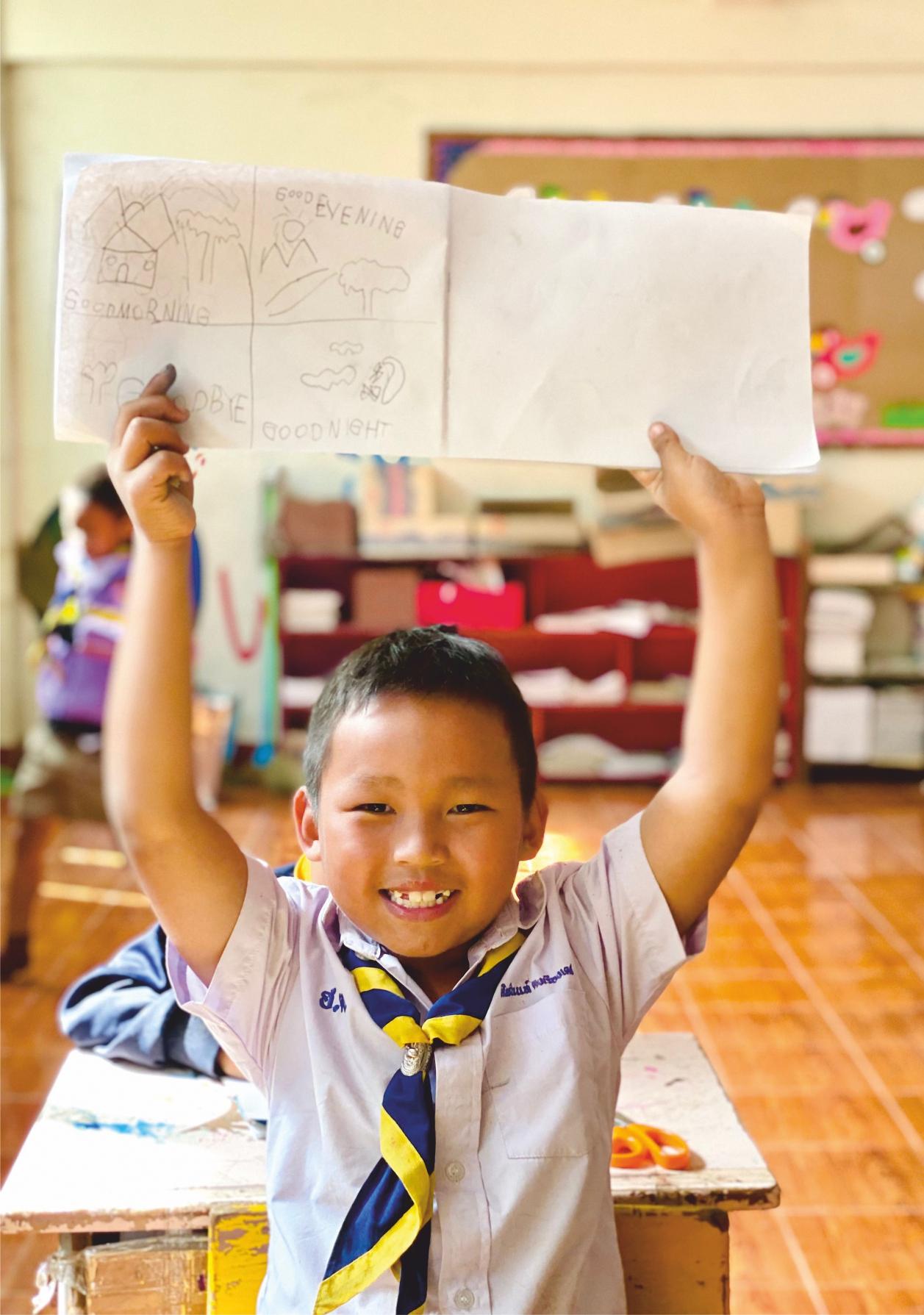
10 ANNUAL REPORT 2020-22
UN GOALS
Quality Education:
Ensuring learners have equal access to quality education
CHALLENGES 2020-22
500m
STUDENTS WORLDWIDE ARE UNABLE TO ACCESS REMOTE LEARNING
617m
YOUTH WORLDWIDE LACK BASIC MATHEMATICS AND LITERACY SKILLS
2/3 IN NEPAL
OF THE POPULATION ARE NOT ACTIVE INTERNET USERS
IN TANZANIA OVER 2/3
OF ILLITERATE PEOPLE IN THE COUNTRIES THAT WE WORK IN ARE WOMEN
3.6m
CHILDREN ARE OUT OF SCHOOL
6 out of 10 children and adolescents are not meeting minimum proficiency in reading and maths. Many of the schools in the countries we work in lack access to quality education and teach in a ‘rote learning style’. This becomes uninspiring and leads to students becoming unengaged with learning and therefore being unable to meet minimum proficiencylevels.
The COVID-19 pandemic presents the world with a unique challenge towards achieving the United Nations Sustainable Development Goal 4 of quality education. Schools were closed in more than 200 countries and territories, impacting more than 91% of students worldwide, with schools in our hubs closing for 11 months or even longer in some.
In a normal year, we would run regular in-person educational workshops for students in our partner schools, on topics such as STEM and English. The pandemic, however, meant that we had to adapt our approach to supporting our partner schools in some of the most disadvantaged communities in the region.
Many students and families became unreachable from the local schools due to a lack of access to the internet and technology. For others, remote learning proved to be time consuming, challenging, and a real financial burden, causing many young learners and their families to despair and feel an increased sense of anxiety
This gap in the learners’ education has likely had detrimental effects on the progress they were making with their education. Now that in-person learning has resumed, we are faced with challenges to reengage and reinspire the learners to continue with their education.
ANNUAL REPORT 2020-22 11
IMPACT NUMBERS
2020-22
3272 BENEFICIARIES REACHED
2020-21
567,233 IMPACT HOURS

2021-22
505,381
IMPACT HOURS
12 ANNUAL REPORT 2020-22
What we are doing
In the year 2020-2021, our hub teams adapted all their usual programme of activities into COVID-19-friendly alternatives to ensure that even the most disadvantaged communities had access to education. This included delivering educational boxes to the homes and villages of students from our partner schools, which included worksheets that the students could do at home, along with some resources to help them complete the worksheets and the activities in them. Our hub teams also came up with innovative solutions to provide remote learning support and run educational sessions and activities over the phone and WhatsApp, for those who did not have access to the internet or a computer
We continued to engage the students as active participants in their learning and continued to provide individualised support for them and their families. With the hope that this will reduce the enlarging gap of education inequalities in the world.
The FutureSense Foundation team delivered 971 hours of educational boxes and remote lessons via phones across our hubs, supporting 799 students during this challenging time.
2021 brought the return of in-person workshop activities in most of our hubs. With precautions in place such as face masks and COVID-19 tests, our hub team members returned to school to facilitate in-person workshops. At first, the focus of our workshops was on returning to learning after a very long break and reigniting the students’ passion for learning
through discovery
In 2022 international participants returned to our hubs to help facilitate our projects. This massively increased the volume of workshops we were able to run across all hubs.
Many of our workshops focused on STEAM (Science, Technology, Engineering, Arts, Mathematics) topics, allowing for a wide variety of topics that promote curiosity, ignite a desire for learning through discovery and help students use their skills as individuals, leaders, and teams.
Taking the learners outside of the traditional classroom setting, we created memorable workshops that engaged the students with problem-solving and leadership


ANNUAL REPORT 2020-22 13
Success Story: Remote Learning Nepal

80% of students were not able to access classes online, by radio, television, or mobile, according to a survey completed by the Nepal Ministry of Education. Students nationwide missed an average of 61 weeks of school, depriving them of educational activities during the COVID-19 pandemic.

This equates to a year and a half of education which is almost certain to have multifaceted and long-term consequences for many young learners Including challenges related to catching up on lost studies, social connections, playtime, and opportunities to develop social skills as well as managing and mitigating the anxiety and stress caused by COVID-19
The rural towns of Nepal were amongst the hardest hit in the world as they could not rely on technology for remote learning nor a robust health care system to care for the ill or to provide a reliable vaccination scheme, causing increased uncertainty for families.
To support the young learners and their families, we reached out to teachers from our partner schools and started collecting contact numbers for the families in Dhulikhel.
We learned that most students had no access to the internet, television, or radio We, therefore, decided to contact students via mobile phones to support them with their continued learning and offer them and their families well-being support.
We provided them with remote learning material to do at home, one-on-one tutoring activities, well-being support for both parents and students as well as guidance for parents on how to engage their children in learning while at home.
14 ANNUAL REPORT 2020-22
While phone-based support could never substitute shared activity-based learning in a group at school, principals from two different partner schools told us that their students who had engaged with our remote learning support were found to have improved in their reading and writing abilities.
Not only the principals but 30 families reached out to us directly as well to express their gratitude for the support received and requested further educational support from FutureSense Foundation. As soon as the pandemic allowed for it we then also started distributing worksheets to the students to work on in-between calls.
Puskar was 8 years old when the pandemic started. Puskar’s school closed down completely leaving him with the only option of remote learning, but he did not have access to the internet and therefore could not receive any school or government-based remote learning support Our FutureSense Foundation Nepal team managed to get in touch
with Puskar’s family via mobile phone to offer him mobile phone-based support for his learning and well-being during uncertain times.
Once schools reopened, our team at FutureSense Foundation Nepal, managed to meet with Puskar in person to ask him about his experience during the pandemic and with mobile phone-based support.
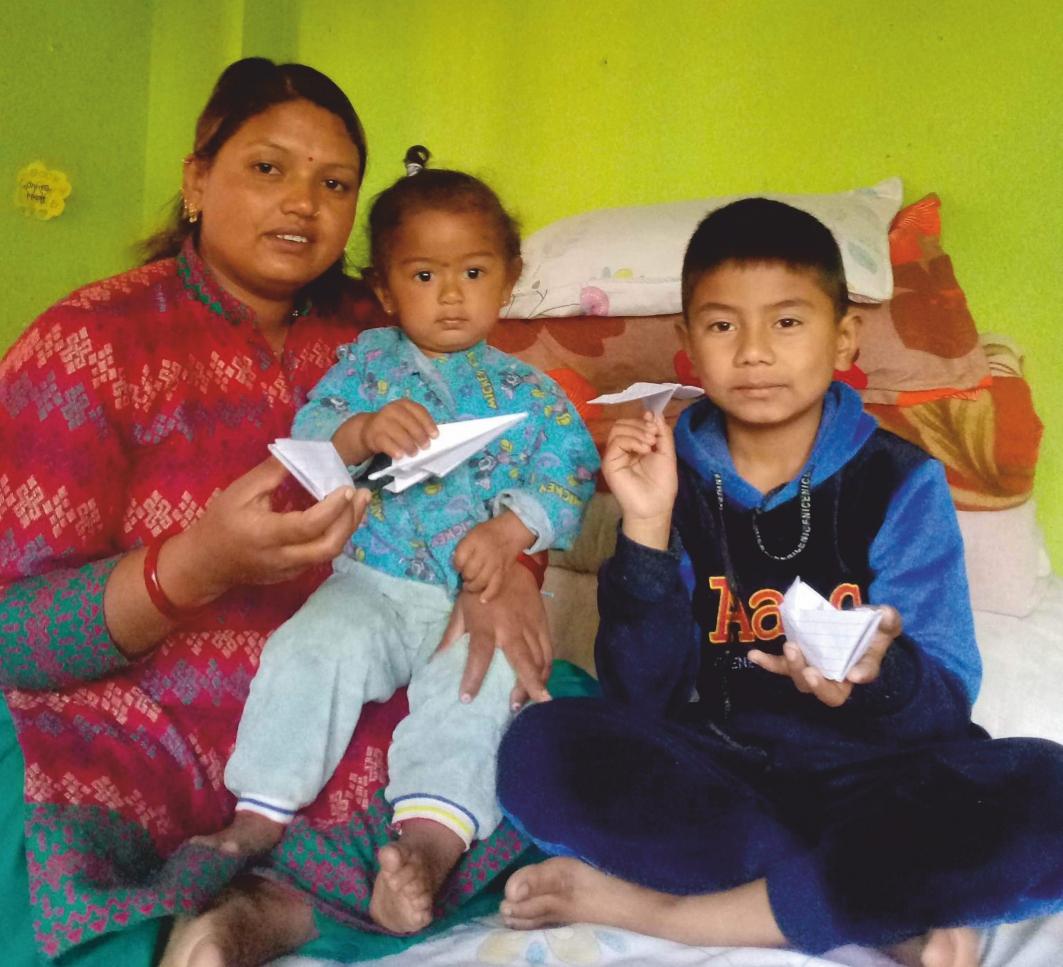
“I don’t like the school closure, long closure. During the lockdown, I played a hide-and-seek game with my sister at home. I did my English homework: match the following words and meanings, I wrote about the festivals and parents.” He also remembers that making a paper plane was fun.
While the mobile-based support helped with English and maths, we did not lose sight of the fact that our youth must be allowed to be children and that play is a vital component of learning and well-being so we made sure we included fun activities like making paper planes, and playing hide and seek into the remote learning materials and activities.
ANNUAL REPORT 2020-22 15
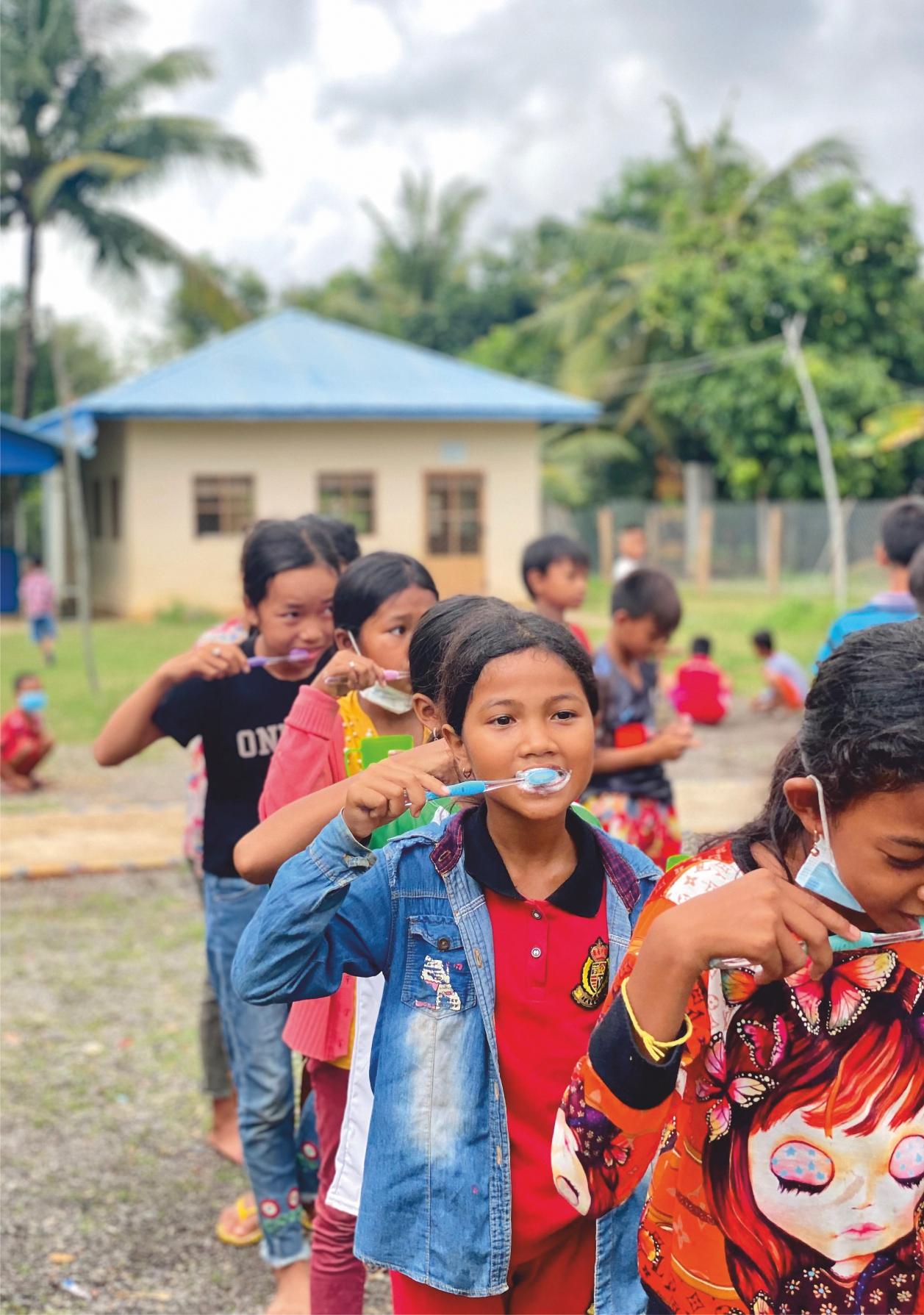
16 ANNUAL REPORT 2020-22
UN GOALS
Health and Well-being:
Preventing illness and promoting health and well-being
CHALLENGES 2020-22
25% OF PEOPLE IN THE WORLD HAVE NO ACCESS TO CLEAN WATER OR SAFE TOILET FACILITIES
3bn
PEOPLE HAVE NO ACCESS TO HANDWASHING FACILITIES WITH SOAP
IN TANZANIA
2.35m
PEOPLE HAVE NO CLEAN WATER
WORLDWIDE THE COVID-19 PANDEMIC TRIGGERED A
25%
INCREASE IN THE PREVALENCE OF ANXIETY AND DEPRESSION
Around 2 billion people don’t have access to clean water or safe toilet facilities, which is around ¼ of the world’s population. Access to this and the knowledge of good hygiene practices are crucial components for children to have a healthystart in life.
COVID-19 has brought attention to hand hygiene and the importance of preventing the spread of disease. Millions of children, however, still go to schools where there is no drinking water, few or no toilet facilities not to mention the complete lack of soap and running water for handwashing.
Poor facilities affect the physical and social safety of the students causing many to fall ill or skip school and therefore has a devastating impact on their futures.
The COVID-19 pandemic caused uncertainty and stress for many, it restricted social interactions, and the ability to exercise and be outdoors and many were robbed of loved ones. This puts stress on everyone and we know that prolonged stress can have significant physical and mental health consequences.
ANNUAL REPORT 2020-22 17
IMPACT NUMBERS 2020-22
1936 BENEFICIARIES REACHED

2020-21
39,619
IMPACT HOURS
2021-22
17,529
IMPACT HOURS
18 ANNUAL REPORT 2020-22
What we are doing
The pandemic brought several issues to the surface and therefore we tailored our approach to help support the communities through this challenging time.
Personal health and hygiene plays a critical role in avoiding communicable diseases. A large number of diseases can be prevented if children develop proper personal hygiene habits which will further improve their health throughout their lifetime. Most children at primary level are not aware of personal hygiene and its impact on their health.
To help combat these issues our team planned and delivered workshops and activities at our partner schools to ensure the children remembered, learned, and practiced basic personal hygiene.
With support from our international participants, we ran WASH (Water, Sanitation, and Hygiene) programmes in our hubs. This included numerous workshops where our learners explored the topics of germs, bacteria, personal hygiene, and clean water
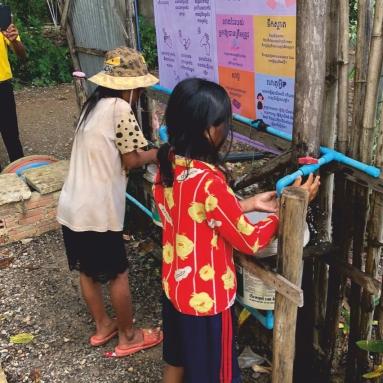

Physical, social and emotional well-being has become a major concern during the pandemic with the major shifts in daily life causing fear, anxiety, anger, and sadness for many The closure of schools, distance from peers, and adapting to new methods of learning and working have a massive impact on whole communities.
Students on our Virtual Internships have developed healthrelated initiatives and materials which are being implemented
into the curriculums in our programmes. Topics covered include period poverty, physical, social and emotional wellbeing, and one health.
In 2022, our international participants supported the facilitation of these workshops and materials to our partner schools. These workshops were varied and covered several topics such as learning about different emotions and what they mean. Using our model of interactive workshops which promote learning through self-discovery, these workshops were active, practical, and involved many group discussions and activities.
ANNUAL REPORT 2020-22 19
Success Story: Health and Hygiene Cambodia
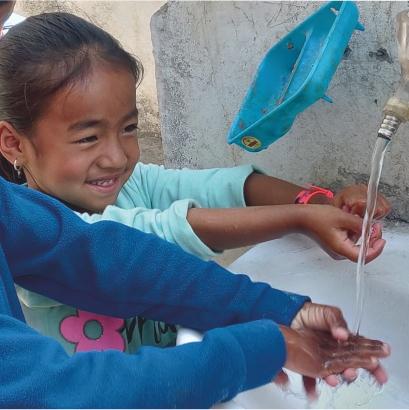

Since 2013, the FutureSense Foundation has partnered with Children’s Action for Development (CAD) to increase the quality of education for the poorest communities in Cambodia. Together we fund and facilitate the Supplementary Education Class (SEC) Programme.
The SEC Programme provides support to 484 students to enhance their quality of education, and improve their health and livelihoods.
Maintaining personal hygiene is crucial in preventing the spread of diseases in a community, After observations of the students, our team noticed that many students were not washing their hands properly; they did not wash their hands with soap or did not follow all of the steps correctly
To ensure good hygiene practices and to help prevent the spread of COVID-19 in the community we delivered handwashing workshops at the SEC Programme to encourage students to wash their hands properly
After the workshop, our team asked the students about hand washing.
Raksa said, “I always wash my hands 3 or 4 times per day I wash with the soap.” She also added, “I wash my hands to clean the germ especially, before eating food, after the toilet, and playing.”
Doeun said, “I always wash 3 or 4 times per day with the soap to prevent COVID-19.”
20 ANNUAL REPORT 2020-22
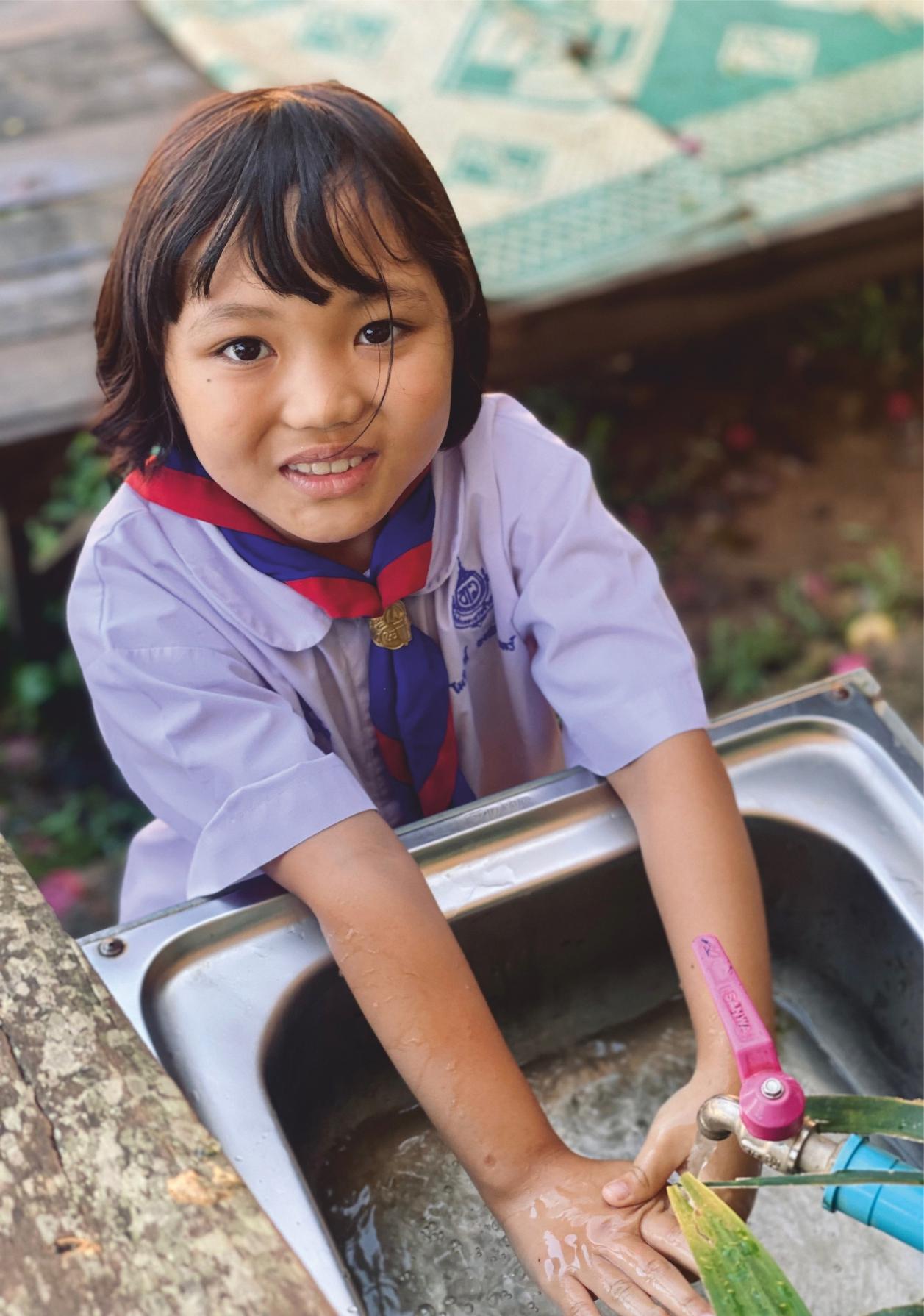
ANNUAL REPORT 2020-22 21
UN GOALS

22 ANNUAL REPORT 2020-22
Livelihoods for the Future:
Developing social and financial awareness
GLOBAL CHALLENGES 2020-22
3.7% OF CAMBODIA’S POPULATION HAVE ACCESS TO A BANK ACCOUNT
71m
YOUNG PEOPLE AROUND THE WORLD ARE UNEMPLOYED
3:1
YOUTH ARE THREE TIMES MORE LIKELY TO BE UNEMPLOYED THAN ADULTS
In the world today there are 71 million young people unemployed, and many millions more are in precarious or informal work, which has been increasing over recentyears.
It is more crucial than ever in this ever-changing world that children gain the social and financial skills which will help them learn and flourish in life. Economic and political instability, ongoing conflicts, climate change, and increasing inequality are all major risks to children and their communities. It is therefore the reason we have put a focus on ensuring our programmes develop the students’ social and financial skills to protect and empower them for the future.
Only 3.7 percent of Cambodia’s 14 million people have bank accounts with a financial institution, while less than 1 percent of those with an account are using them to save money, according to a World Bank report. Many people in Thailand and Cambodia choose to migrate to find employment opportunities; however, this comes with risks as many workers end up undocumented which puts them at risk of human trafficking.
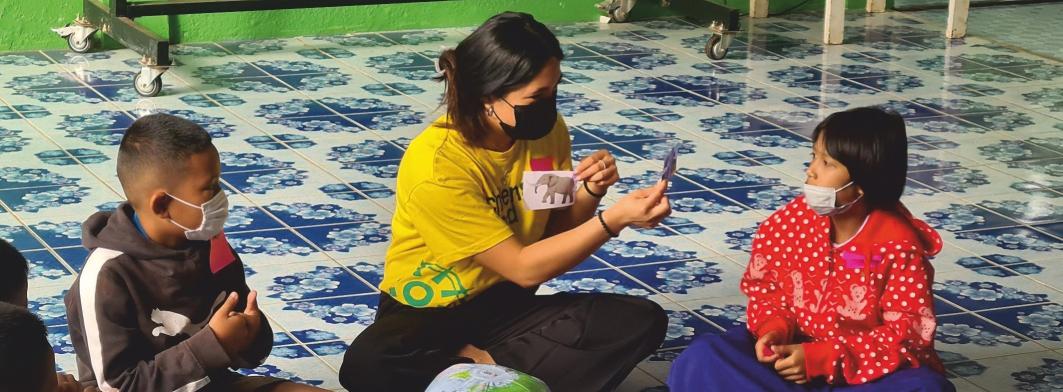
ANNUAL REPORT 2020-22 23
What we are doing
In the year 2020-21 we forged a new partnership with Aflatoun International. Aflatoun is an international NGO that partners with organisations like ourselves to provide social and financial education for children and young people worldwide.

Aflatoun provides educational resources to support this initiative, these are then contextualised by our hub teams to make them suitable for the local communities.
In 2022, we implemented this programme as part of our livelihoods curriculum in our Thailand Hub The workshops were facilitated by our hub team and international participants, and learners were engaged with a variety of topics such as countries of the world and their differences and similarities to their own country
The workshops focused on a variety of topics such as language, culture, currency, and geography They also engaged with social topics such as learning about how to be a good leader and team player and learning about empathy and inequalities. These workshops are designed to help the learners develop real-life skills, that will help them in the future. We hope to implement this curriculum across all our hubs in the future.
24 ANNUAL REPORT 2020-22
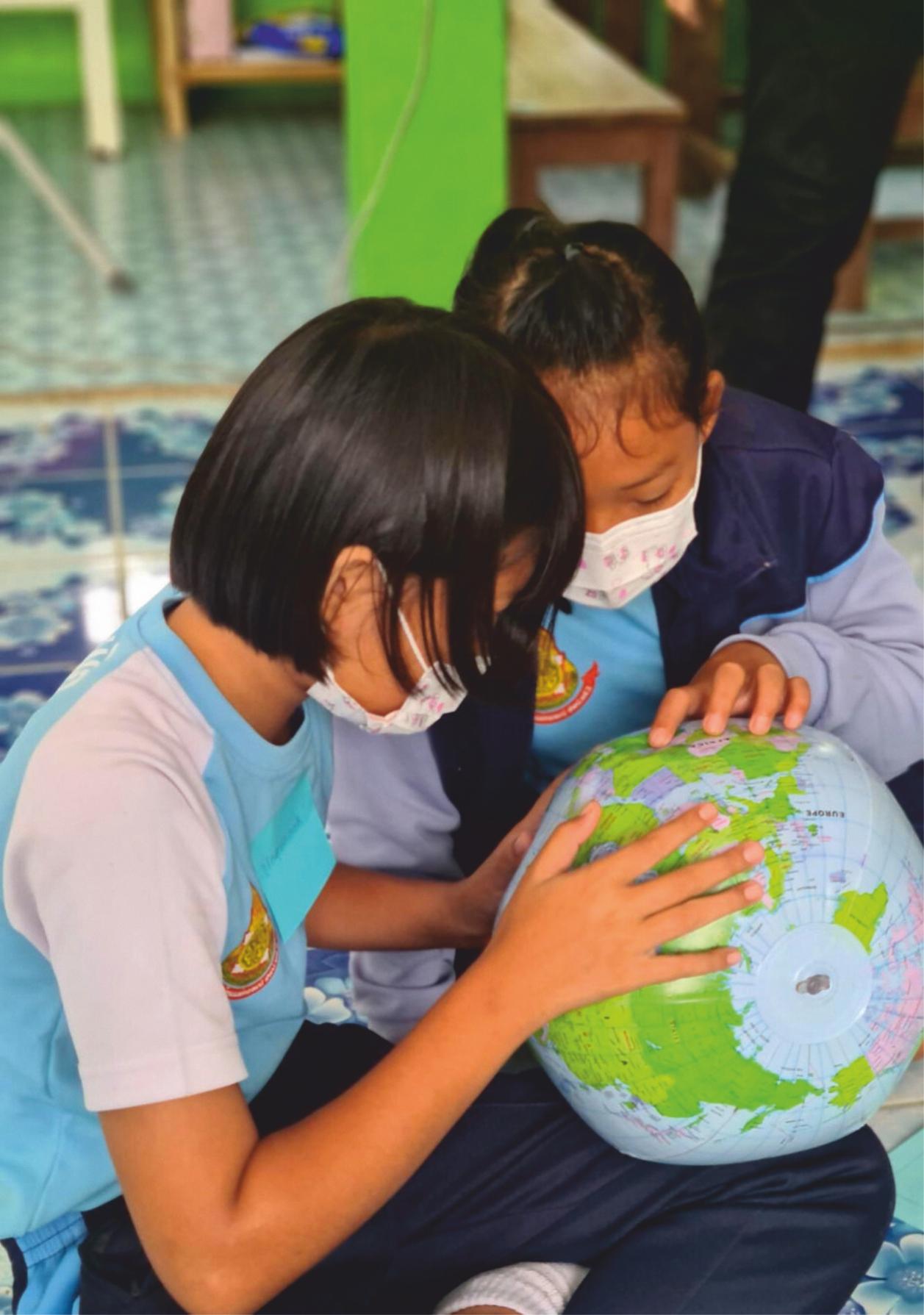

ANNUAL REPORT 2020-22 25
IMPACT NUMBERS 2020-22
56 BENEFICIARIES REACHED
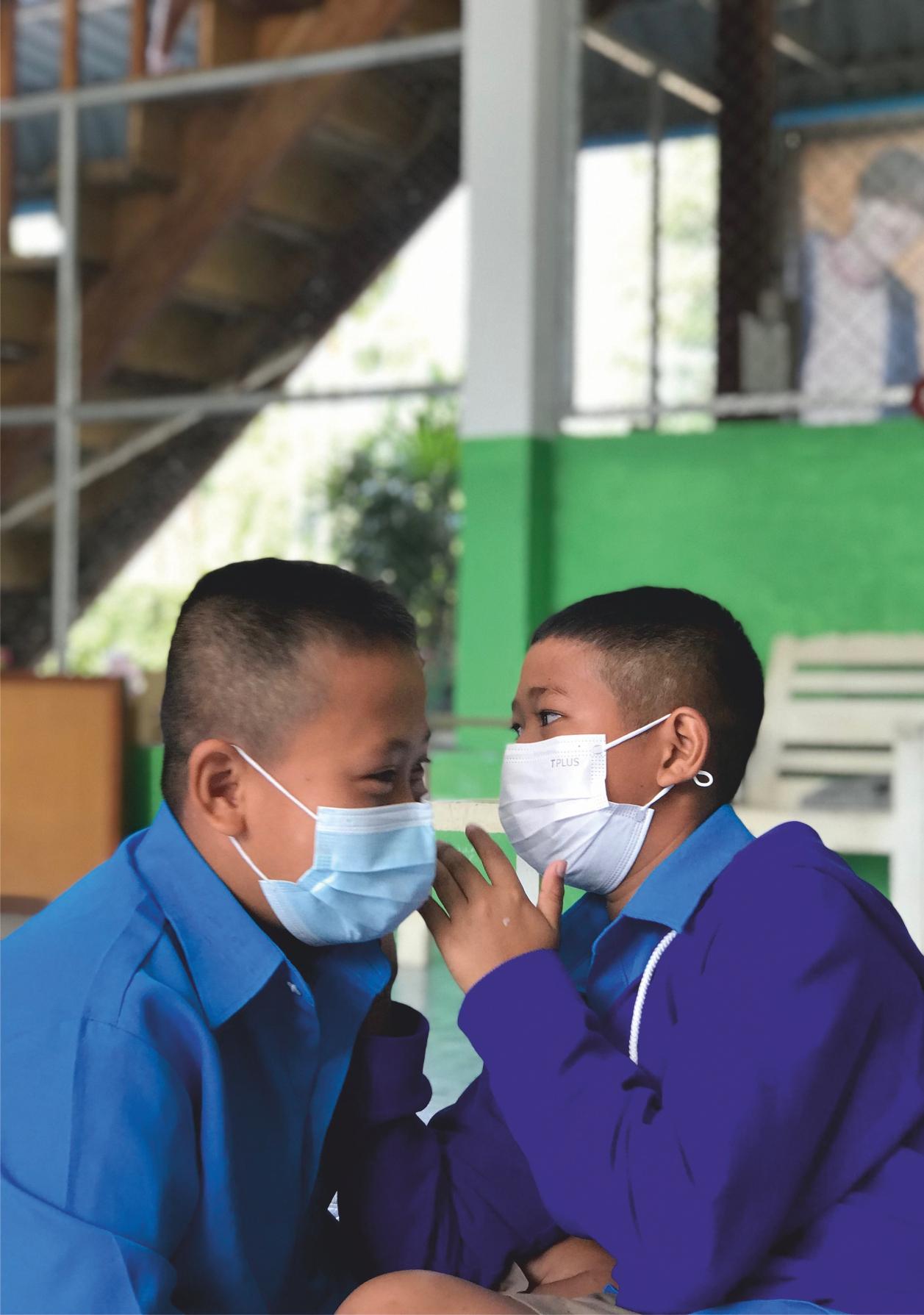
2020-21
7,924 IMPACT HOURS
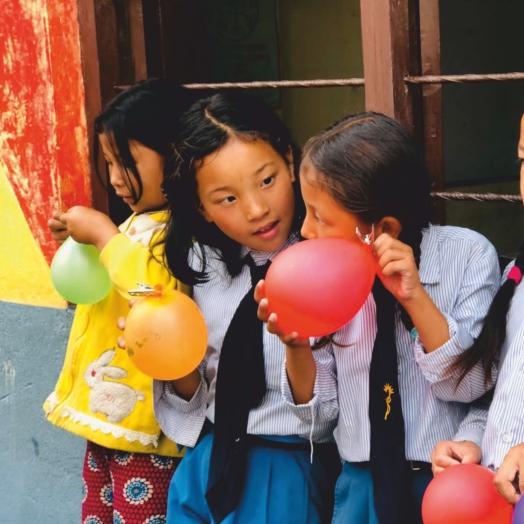
2021-22
3,506 IMPACT HOURS
26 ANNUAL REPORT 2020-22
Case Study: Lifeskills Thailand
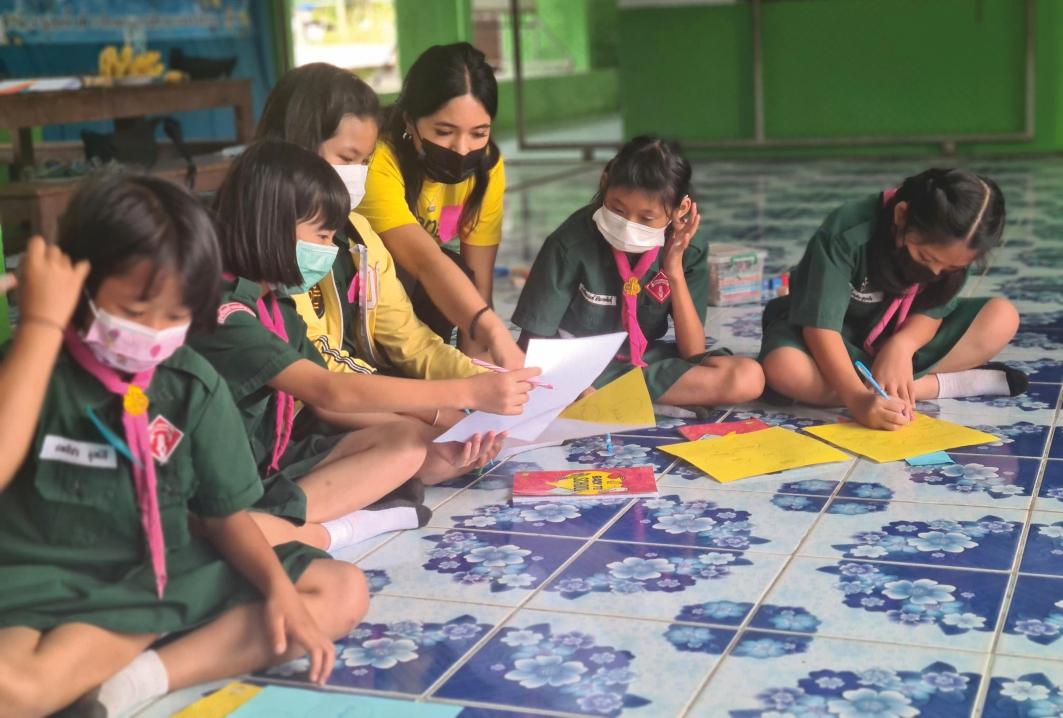
Our Thailand hub supports hill tribe communities in Mae Hong Son, which is a remote and mountainous province located in northern Thailand. According to a United Nations report the poverty rate in Mae Hong Son is 34 percent, making it the poorest region in the country
Social and financial skills in education for children in Thailand are least prioritised in the schools’ curriculums. Most of the students don’t have much chance to learn about social and financial management skills, which will likely affect their money management in the future The central bank conducted a survey and found that only 39% of total respondents would have sufficient savings for three months in case of an emergency situation if they lost their main income.
To address these challenges we forged a new partnership with Aflatoun International With the help of Aflatoun’s carefully crafted resources and the local contextualisation of the resources by our FutureSense Foundation in-country teams we are on a journey to empower children to believe in themselves and know their rights and responsibilities. It helps them to understand and practice saving and spending and start their own innovative enterprises Considering the importance of social and financial literacy education, we are now delivering regular workshops to youth in our partner schools in Thailand.
Through better financial skills, children can maximize their life choices and have a positive impact by investigating their own personal values. If students have financial knowledge and skills, it will be beneficial for them in the future, to get a job start a business, and maintain their financial income in daily life.
We have launched this initiative across 4 hill tribe schools in Thailand and aim to continue expanding the initiative across schools in Thailand and our other hubs. The workshops focused on basic concepts of human rights through games discussing concepts of diversity, respect, and empathy The students were engaged in activities that emphasised the significance of teamwork and leadership
We will be continuing these workshops and building on the knowledge already developed, with the long-term goal of positively impacting the students’ social and financial skills and knowledge to help give the best possible opportunity to succeed in life.
ANNUAL REPORT 2020-22 27
CHALLENGES 2020-22
AROUND THE WORLD
129m
GIRLS ARE OUT OF SCHOOL
ONLY
49% OF COUNTRIES HAVE ACHIEVED GENDER PARITY IN PRIMARY EDUCATION
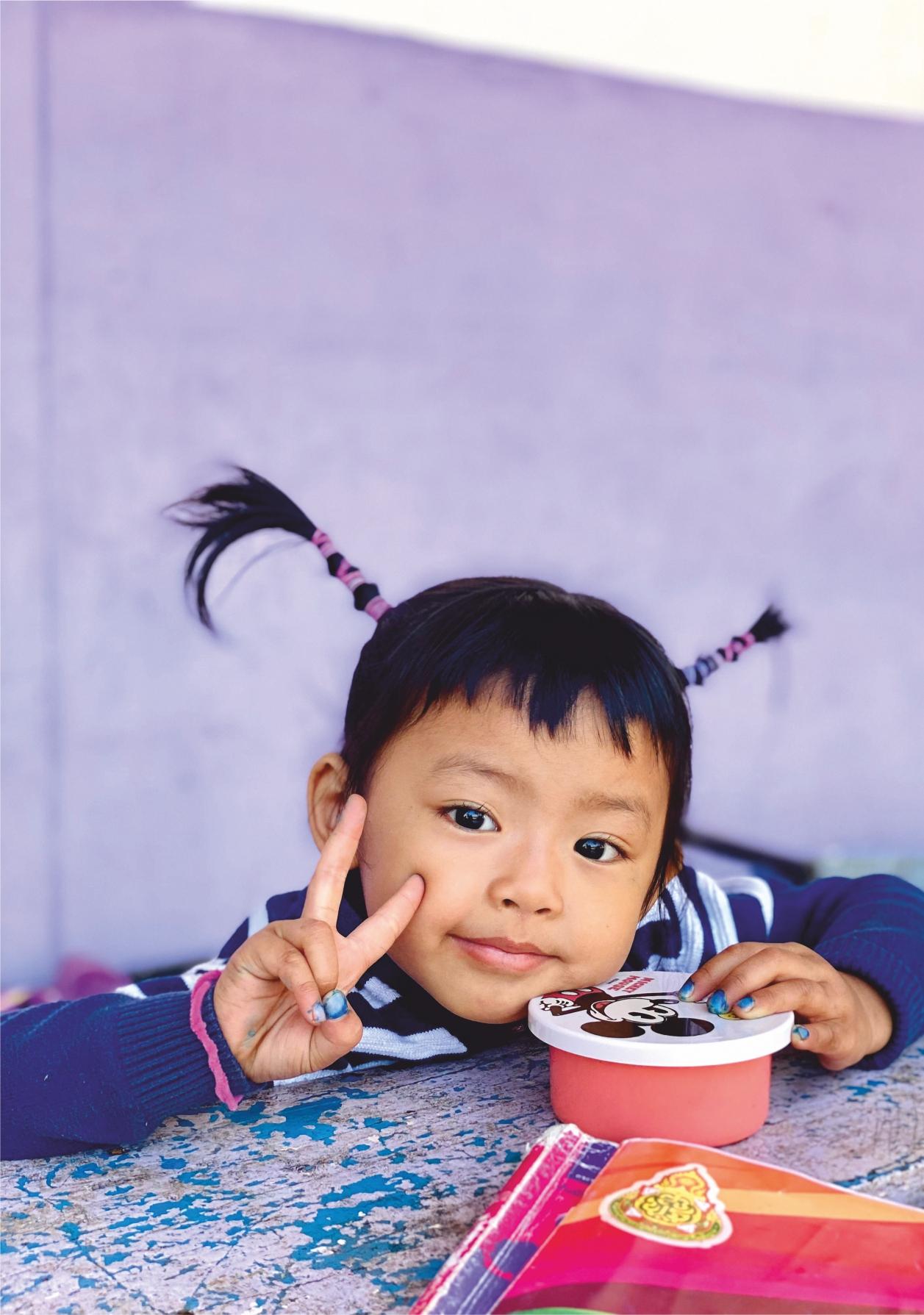
28 ANNUAL REPORT 2020-22
UN GOALS
Cross-cutting Theme:
Gender equality
The FutureSense Foundation team delivered 971 hours of remote lessons via phone, and educational boxes across our hubs, supporting 799 students during this challenging time.
2021 brought the return of in-person workshop activities in most of our hubs. With precautions in place such as face masks and COVID-19 tests, our hub team members returned to school. At first, the focus of our workshops was on returning to learning after a very long break and reigniting the students’ passion for learning through discovery
In 2022 international participants returned to our hubs to help facilitate our projects. This massively increased the volume of workshops we were able to run across all hubs.
Many of our workshops focused on STEAM (Science, Technology, Engineering, Arts, Mathematics), allowing for a wide variety of topics that promote curiosity, ignite a desire for learning through discovery and help students use their skills as individuals, leaders, and teams.
Taking the learners outside of the traditional classroom setting, we created memorable workshops that engaged the students with problem-solving and leadership

ANNUAL REPORT 2020-22 29
STEAM for girls
STEAM (Science, Technology, Engineering, Arts, Mathematics) not only develop students’ technical skills but ignite their curiosity for learning and engaging in self-discovery, all while simultaneously developing their social and emotional skills such as empathy, collaboration, and perseverance.
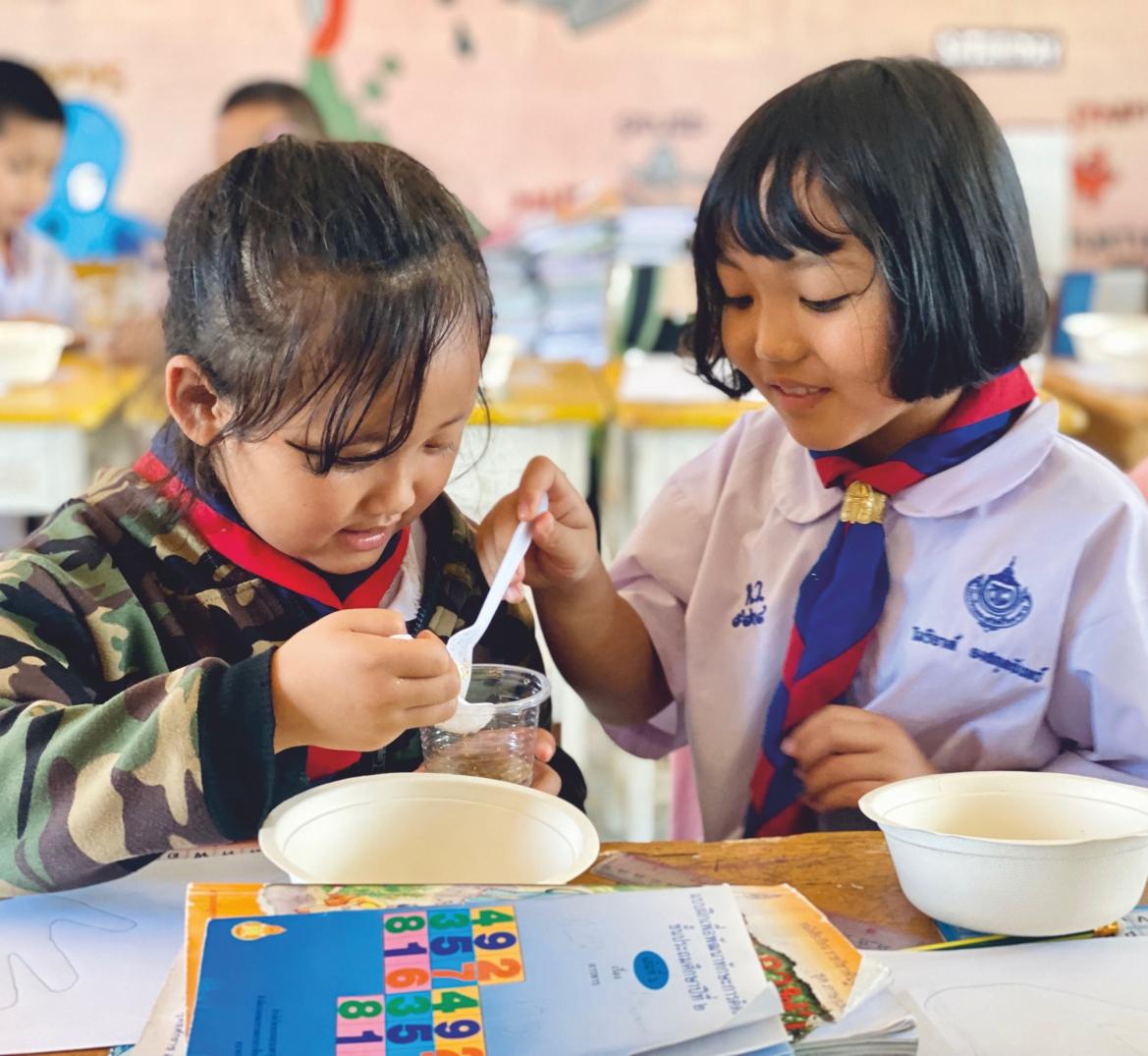
Women are undervalued in the Science, Technology, Engineering, Arts and Mathematics markets, and as such, discouraged from entering these sectors due to limited support and opportunities. STEAM exposes women to these options at a young age, improving the expertise needed to boost their skills for navigating a career in the sector
STEAM has the power to help students develop social and emotional skills all while simultaneously learning technical skills, growing their curiosity, achieving things they did not think were possible, and little by little starting to break their very own glass ceilings.
Across our hubs we have implemented STEAM workshops for our partner schools and their students, running workshops for a variety of year groups on numerous different STEAM topics.
30 ANNUAL REPORT 2020-22
Period poverty
30% of women and girls struggle to afford sanitary products, and over half have to use toilet paper as an alternative.
In many disadvantaged communities, this statistic is worse - in India only 12% of women have access to sanitary products. With the help of our virtual interns, we have developed a health curriculum and resources containing education on menstrual, reproductive, and sexual health, as well as matters of consent and safety


After consulting local community members, they were able to share their perspectives surrounding their culture, why these health issues might be occurring, and what barriers exist that could prevent awareness and the changing of behaviours. Our virtual interns from health and nursing backgrounds ensured that culturally appropriate and sensitive sexual, menstrual, and reproductive health education lessons were produced that will raise awareness and reduce stigma.
We reached 399 students and 2 teachers with 25 hours of reproductive health workshops relating to period poverty
ANNUAL REPORT 2020-22 31
UN GOALS

32 ANNUAL REPORT 2020-22
Cross-cutting Theme: Climate Action
Evidence that climate change is real is unequivocal.The planet’s average surface temperature has increased by1 degree Celsius since the late 19th century and global sea levels rose about 8 inches (20 centimetres) in the last century
As a result of climate change, we will and are already experiencing more extreme weather events, more droughts and heat waves, more frequent and intense storms, and sea levels will rise, flooding the lowest lying lands.
The major effects of all these changes will cause stress on the world’s water and food supply loss of biodiversity and forced migration of people out of areas most affected. Other smaller rural communities will become cut off from the world due to flooding, land erosion, and destroyed infrastructures, such as mountain communities in Nepal, hill tribes in Thailand, and remote valleys in Peru.

The rural and disadvantaged communities that we work with are even more at risk as they often rely on outdoor work such as farming for their livelihoods. They have less economic stability and therefore suffer worse consequences from these effects of climate change.
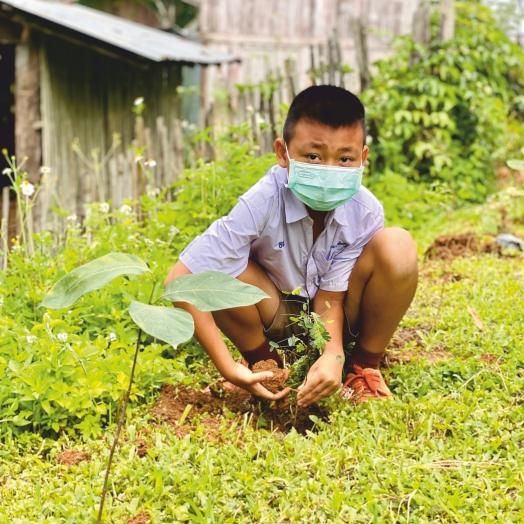
The next generation will be the ones that have to live with the effects of climate change and it is them calling for a change. Youth have voices, they have power and they are stepping up to demand things so we want to guide them, mentor them, and empower them to make better decisions.
We want to show them how to increase the conversation around climate change but more than that we want to support them in taking action together
ANNUAL REPORT 2020-22 33

34 ANNUAL REPORT 2020-22
What we are doing
Tree planting
In 2022 our participants helped plant 2771 trees in our hubs. Our Thailand hub became climate positive, by offsetting more carbon emissions than were generated by its activities and incoming student groups.
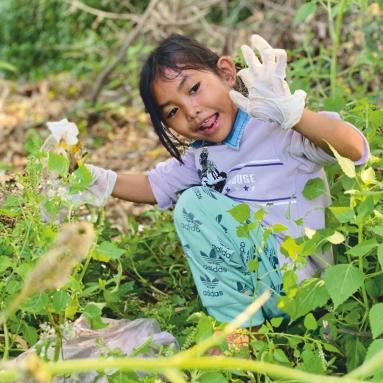
Climate action workshops
We increased the number of climate action educational workshops in our hubs which involved running a series of environmental awareness workshops for students in our partner schools. These workshops were aimed at helping students understand how they have an impact on the environment and how they can protect it in their local area.
Eco Clubs
We have launched Eco Clubs in some of our hubs. These Eco Clubs are student-led initiatives that empower them to run projects to look after their local environment.
Community clean-ups
Community clean-ups continued to be a regular occurrence in our hubs with our teams providing the resources to complete them Our teams brought together groups of students from our partner schools to run a community cleanup in their local area.
All of our initiatives were aimed at the younger generation to empower them to become change-makers in their community as we truly believe that by providing them with the knowledge and resources, they can have a lasting impact on their environment.
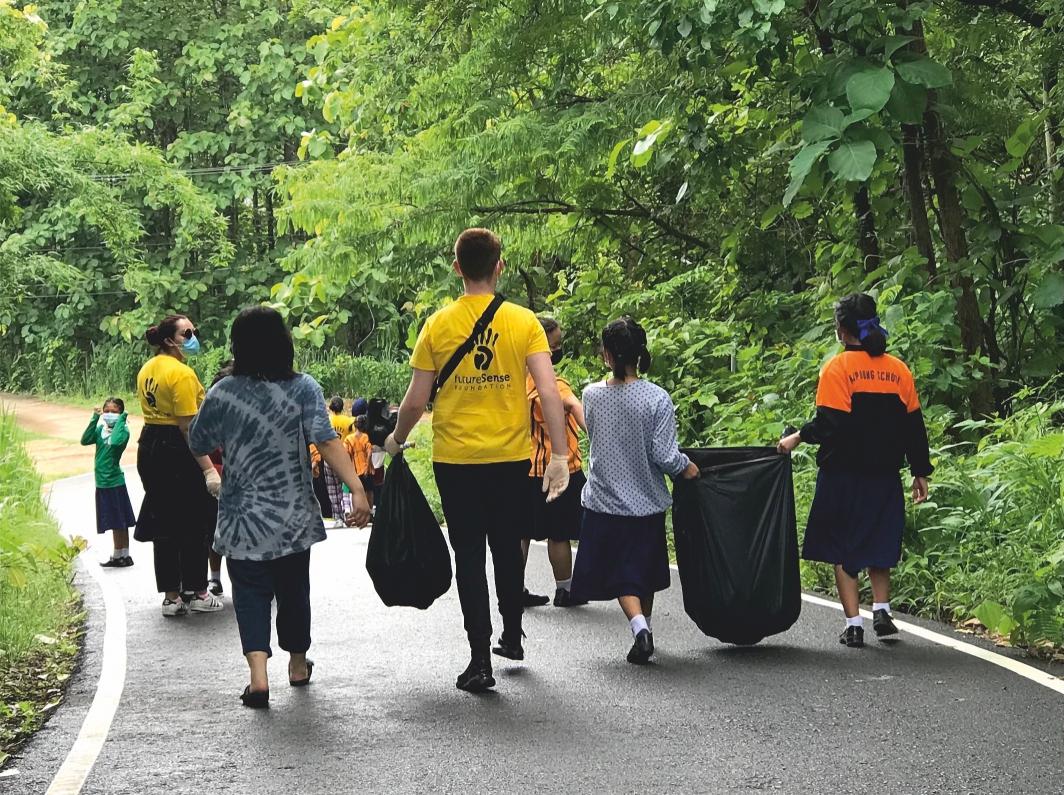
ANNUAL REPORT 2020-22 35
Supplementary Education Class Programme: New classrooms and toilets
The Supplementary Education Class Programme (SEC) supports children from vulnerable families, often living below the poverty line, in the Battambang region in Cambodia who were either dropping out of education or falling behind at school and needed additional support to learn.
The Cambodian government only offers students 4 hours of learning per day, forcing many families to pay for additional education for their children, and forcing those who can't afford this to miss out on vital learning.
The SEC Programme has been jointly run by FutureSense Foundation and a local Cambodian NGO Children’s Action for Development (CAD) since 2012 and has provided free education to around 2200 students.
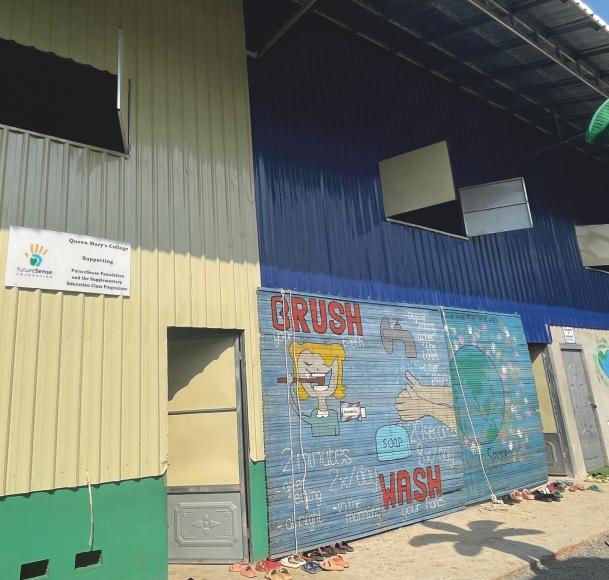
The programme has proven to be highly successful. With the help of the SEC programme 99.9% of the students now pass from primary to secondary education, while the rate for students from the target group otherwise sits around 50%.
In 2022, students and teachers from Queen Mary s College embarked on a challenge to help fund the building of 2 classrooms to accommodate the education of over 100 students in the SEC Programme. They fundraised an amazing total of £8,161 allowing the building of the new classrooms to get underway Today the new classrooms are in daily use and are supporting the education of many underprivileged children.
In addition to these new classrooms, it became apparent that we needed new toilets to be built in the facility The students and teachers from New College Bradford took on the challenge to fundraise £800 towards funding new toilet facilities for the centre.

These additions to the centre have made a massive difference to the students’ education, and we see the impact of this on a daily basis.
We cannot thank the students and teachers from Queen Mary’s College and New College Bradford enough for their generosity and hard work in supporting this project.
36 ANNUAL REPORT 2020-22
UN GOALS
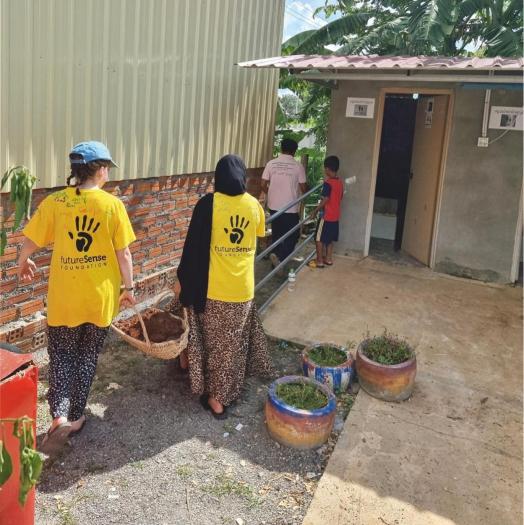
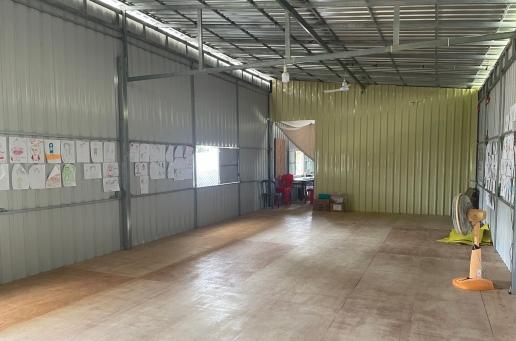
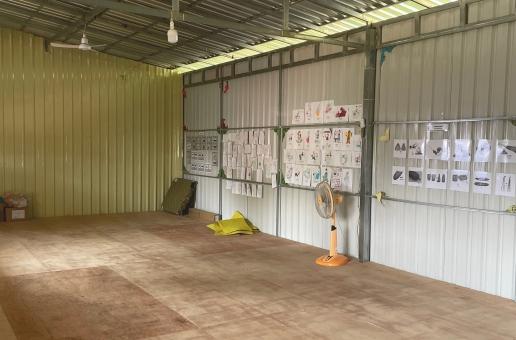
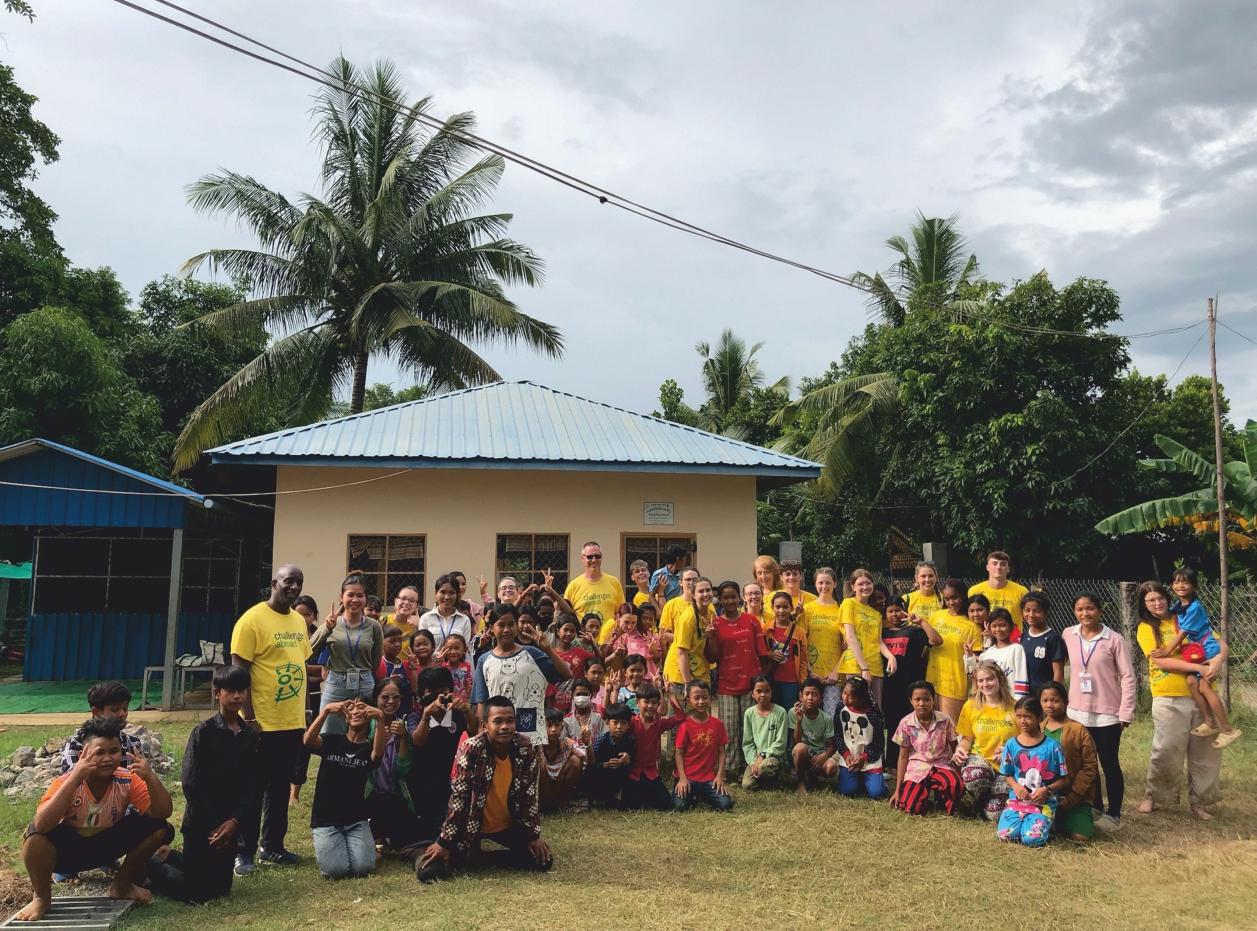
ANNUAL REPORT 2020-22 37

38 ANNUAL REPORT 2020-22
Financial Statement 2020-22
As with all charities, our Foundation’s income was impacted significantly during and in the aftermath of the devastating global pandemic.
In addition, our Foundation is founded on the premise that our overseas projects will constantly benefit from visits by UK and Australia-based students. Travel was hit particularly badly for several years and this did not happen.
Our Foundation’s vision is to support disadvantaged communities around the world to help them achieve their aspirations for a better future. During the pandemic, support in these communities became even more crucial than ever We were determined to keep supporting a number of projects and we, therefore, decided to borrow money from the government through a COVID-19 loan to ensure we could continue to provide vital support to these communities.
Thus we can see from the accounts that expenditure on projects and maintaining a skeleton overseas teams exceeded income for a number of years.
Given the reopening of travel and some great work from our team, we are rapidly getting into a position where income is more than sufficient to fund our overseas teams and identified projects. Any monies borrowed are now being repaid on an agreed basis.
Statement of Financial Activities
Charitable Activities Expenditure 2021-22:
Livelihood Support 5%
Health 25%
70% Education Initiatives
ANNUAL REPORT 2020-22 39
Challenges Events Resources from generated funds Gift Aid Group support Total resources generated Events cost Net resources available for Charitable activities Charitable activities Education initiatives Health Livelihood support Total charitable activities Fundraising support Total resources used Net resources generated Governance 2021/22 110,599 8,645 43,103 162,347 74,716 88,487 31,603 6,321 126,411 38,173 173,958 99,242 9,374 £ £ £ £ £ £ £ £ £ £ £ -£ £ 87,631 £ - £ 2020/21 87,208 87,208 87,208 70,292 25,104 5,021 100,417 13,743 121,105 33,897 1,150 6,945 £ £ £ £ £ £ £ £ £ £ -£ £

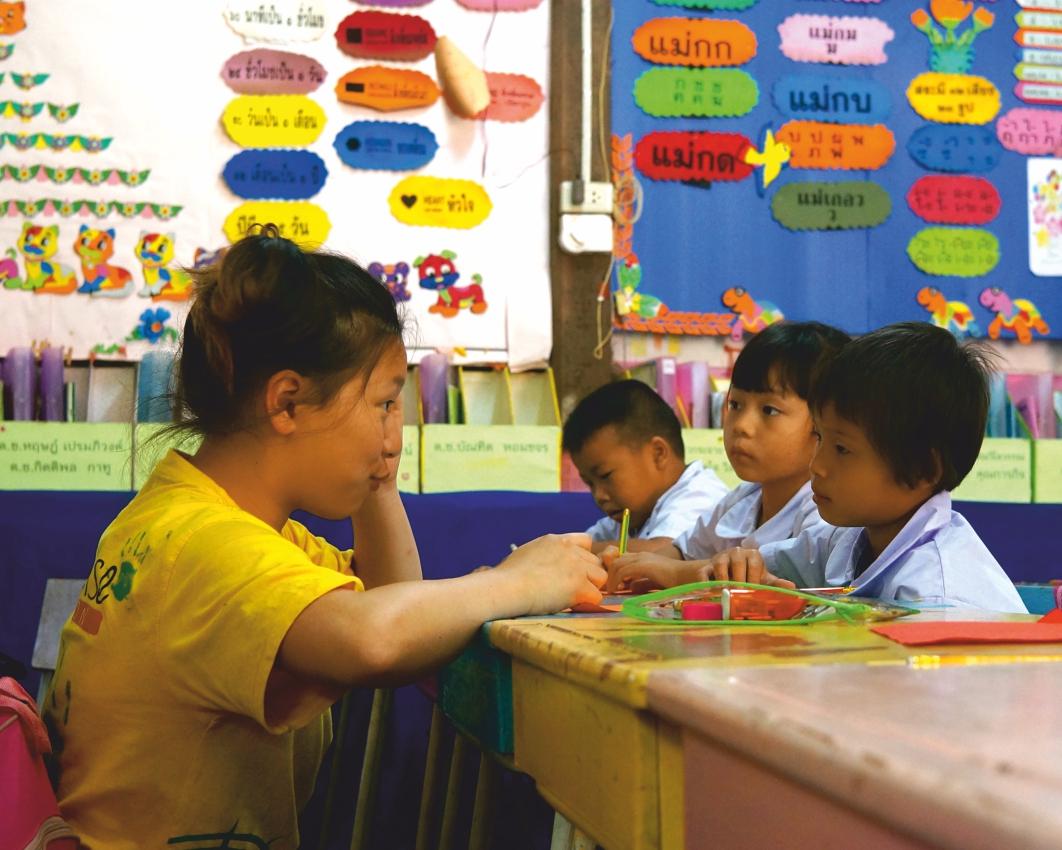
40 ANNUAL REPORT 2020-22
Governance and Foundation Development
In the last year, we have strengthened our board with the appointment of new trustees and engaged a number of specialist advisers.
To enable the board to most effectively support our Foundation’s work, we have set up a number of sub-communities consisting of various trustee members focusing on the following topics:
Finance: understanding the key drivers of the overseas operational costs, analysing the various income strands and producing regular cashflow forecasts for the trustees
Resourcing and recruitment: development of capability and capacity model for people in each country and putting recruitment plans in place to meet resourcing requirements
People development: development of a skills and experience matrix and development of a training programme to meet the needs
Programme capabilities: detailed research into how the charity supports each project and the development of success criteria for each
Given the need for urgent rebuilding, we have concentrated on short-term actions and performance. This focus and prioritisation has successfully stabilised the foundation and built vital building blocks for the rapid growth now projected.
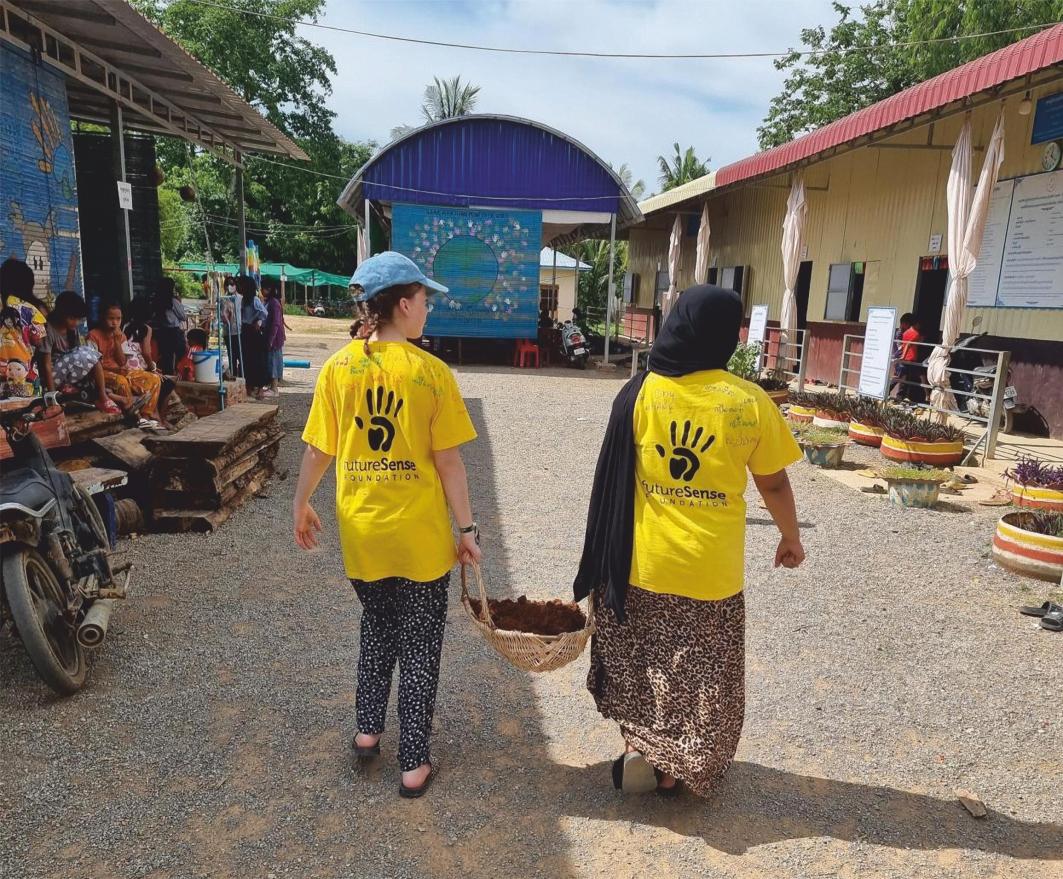
ANNUAL REPORT 2020-22 41
Strategic Plan 2023-26 Looking Ahead:
We are thrilled to be developing a long-term strategic plan that will enable us to build upon the tremendous growth we’ve experienced in the past year.

Despite the challenges of the pandemic, our Foundation has seen a surge in support from students, thanks in part to the UK Government Turing Scheme’s partnership with Challenges Abroad. This will enable the Foundation to have substantially greater support for delivering its programmes but also to develop capability and capacity through the increased financial contributions from the group companies.
Over the three year period, we are looking at our income growing to over £500,000 to enable us to meet our three goals:
Achieve financial sustainability, build our reserves
Build organisational capacity and capability
Develop our programme management capability
As we move forward, our strategic plan will prioritise strengthening our in-country capabilities to support our growth and continue to identify new partnerships and projects that will help us expand our global presence. We are looking to expand our presence both in the countries where we currently operate but also exploring new destinations to reach more communities.
42 ANNUAL REPORT 2020-22
Thank You to All Our Supporters!

You can follow us on LinkedIn, Instagram and Facebook to help spread our message and join our strong network of supporters.






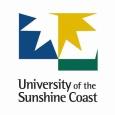





You can also support our work by fundraising for us or joining our regular givers. Help us continue to build a fairer world.






If you donate £10 per month, we can provide 10 teachers with a capacity building workshop




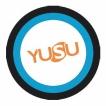




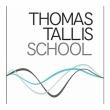

If you donate £15 per month, we can give a child in Cambodia free supplementary education for a month (including learning material, daily snack and clean drinking water)
If you donate £50 per month, we can provide free clean drinking water for a whole school
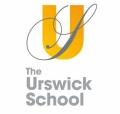

You can help make a difference through as little as one like, one share and one donation.





leave your handprint on the world ANNUAL REPORT 2020-22 43
Join our supporters to make a difference
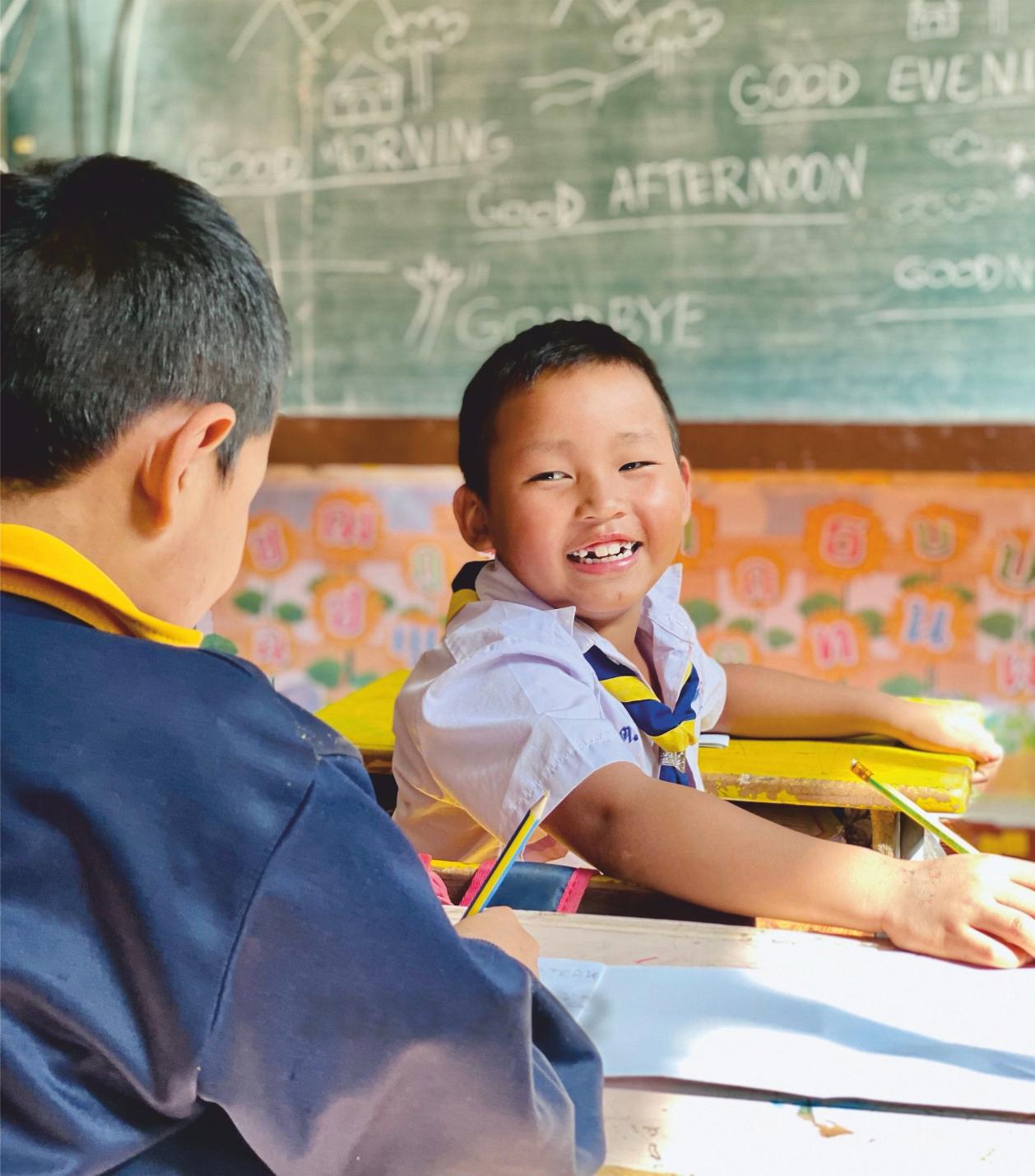
For information about getting involved, visit our website or get in touch on the details below. www.futuresensefoundation.org The FutureSense Foundation The Old Town Hall, Market Place Newbury RG14 5AA Contact Us @futuresense_foundation FutureSense Foundation 01635 285 669 info@futuresensefoundation.org www.facebook.com/futuresensefoundation 2020-2022





























































































